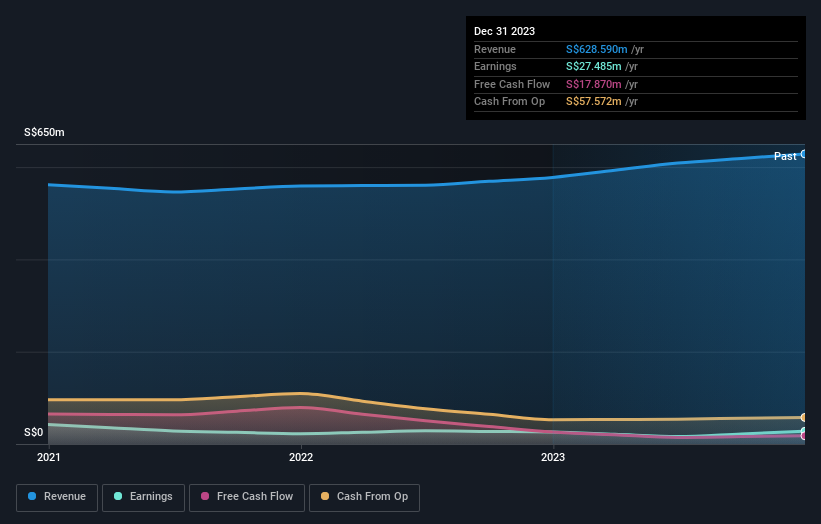With a 52% stake, QAF Limited (SGX:Q01) insiders have a lot riding on the company
Key Insights
Insiders appear to have a vested interest in QAF's growth, as seen by their sizeable ownership
A total of 2 investors have a majority stake in the company with 55% ownership
Past performance of a company along with ownership data serve to give a strong idea about prospects for a business
Every investor in QAF Limited (SGX:Q01) should be aware of the most powerful shareholder groups. With 52% stake, individual insiders possess the maximum shares in the company. In other words, the group stands to gain the most (or lose the most) from their investment into the company.
So, insiders of QAF have a lot at stake and every decision they make on the company’s future is important to them from a financial point of view.
Let's take a closer look to see what the different types of shareholders can tell us about QAF.
Check out our latest analysis for QAF
What Does The Institutional Ownership Tell Us About QAF?
Institutional investors commonly compare their own returns to the returns of a commonly followed index. So they generally do consider buying larger companies that are included in the relevant benchmark index.
Institutions have a very small stake in QAF. That indicates that the company is on the radar of some funds, but it isn't particularly popular with professional investors at the moment. So if the company itself can improve over time, we may well see more institutional buyers in the future. When multiple institutional investors want to buy shares, we often see a rising share price. The past revenue trajectory (shown below) can be an indication of future growth, but there are no guarantees.
Hedge funds don't have many shares in QAF. Our data shows that Sing Chung Lam is the largest shareholder with 48% of shares outstanding. In comparison, the second and third largest shareholders hold about 7.1% and 1.2% of the stock. Furthermore, CEO Lin Kejian is the owner of 0.9% of the company's shares.
After doing some more digging, we found that the top 2 shareholders collectively control more than half of the company's shares, implying that they have considerable power to influence the company's decisions.
While it makes sense to study institutional ownership data for a company, it also makes sense to study analyst sentiments to know which way the wind is blowing. As far as we can tell there isn't analyst coverage of the company, so it is probably flying under the radar.
Insider Ownership Of QAF
While the precise definition of an insider can be subjective, almost everyone considers board members to be insiders. Company management run the business, but the CEO will answer to the board, even if he or she is a member of it.
Insider ownership is positive when it signals leadership are thinking like the true owners of the company. However, high insider ownership can also give immense power to a small group within the company. This can be negative in some circumstances.
Our most recent data indicates that insiders own the majority of QAF Limited. This means they can collectively make decisions for the company. Given it has a market cap of S$480m, that means they have S$249m worth of shares. Most would be pleased to see the board is investing alongside them. You may wish todiscover (for free) if they have been buying or selling.
General Public Ownership
With a 39% ownership, the general public, mostly comprising of individual investors, have some degree of sway over QAF. While this group can't necessarily call the shots, it can certainly have a real influence on how the company is run.
Private Company Ownership
It seems that Private Companies own 7.8%, of the QAF stock. Private companies may be related parties. Sometimes insiders have an interest in a public company through a holding in a private company, rather than in their own capacity as an individual. While it's hard to draw any broad stroke conclusions, it is worth noting as an area for further research.
Next Steps:
While it is well worth considering the different groups that own a company, there are other factors that are even more important. For example, we've discovered 2 warning signs for QAF (1 is potentially serious!) that you should be aware of before investing here.
If you would prefer check out another company -- one with potentially superior financials -- then do not miss this free list of interesting companies, backed by strong financial data.
NB: Figures in this article are calculated using data from the last twelve months, which refer to the 12-month period ending on the last date of the month the financial statement is dated. This may not be consistent with full year annual report figures.
Have feedback on this article? Concerned about the content? Get in touch with us directly. Alternatively, email editorial-team (at) simplywallst.com.
This article by Simply Wall St is general in nature. We provide commentary based on historical data and analyst forecasts only using an unbiased methodology and our articles are not intended to be financial advice. It does not constitute a recommendation to buy or sell any stock, and does not take account of your objectives, or your financial situation. We aim to bring you long-term focused analysis driven by fundamental data. Note that our analysis may not factor in the latest price-sensitive company announcements or qualitative material. Simply Wall St has no position in any stocks mentioned.

 Yahoo Finance
Yahoo Finance 

